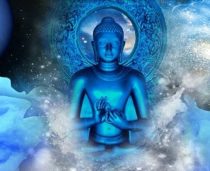Man: Did she get rid of the fleas?
DJ: Yeah, I put a drop on her back.
Man: Alright, today’s subject is connections.
DJ: Yeah, so let’s talk about connections.
Man: What do you mean by connections? Does it have something to do with relationships that we were talking about last time?
DJ: Well yeah, I mean we’ve got two basic things happening in the universe. One is the spaciousness that everything happens in. The other is the phenomenon itself, the existence itself, matter, and all of that. Then there’s the relationships within the matter, and the patterns that are formed and exist and change. This is what gives the quality to the experience. It is the relationship between the objects, because otherwise objects are just objects.
You are actually talking about, and this is kind of an odd thing, but you were talking about being in an input deprived environment, like a prison, like a jail. You were talking about having to watch shows about people who were in jail and things like that, and that’s kind of like. There’s minimal amount of opportunity to connect with inanimate objects and limited amount of opportunity to connect with other humans. There is really not much else there. There’s no animals, and out in the yard they’ve got maybe there’s some garden or maybe not, depending on the time. So that makes those human interactions much more pronounced and dramatic if you will? The mind focuses on those things, just like it does with certain relationships in the regular world, and everyone has these connections of some sort. Even people that connect primarily with animals or primarily with whatever their own mastery is, everyone still has these connections on different levels of intensity.
So the connections add like equality. The way I want to describe it is to talk about it like its sound, maybe, and the different qualities of the connections are reflected then in the atmosphere, the qualities of the experience, the smoothness, or coarseness. All these things have to do with the types of connections that are happening. The way that we experience life, for many people, is all about the connections, because they don’t know about the spaciousness. They’re not aware of maybe the greater consciousness that exists within them, so they focus on these relationships, these connections, because they know that this will change their quality of life. If they like everyone and everyone likes them, they’ll have a quality of life that’s different than if they don’t like the people that are around or if the people that are around don’t like them.
For many people though, they’re substituting their connections with inanimate things like a television show or something like this, so they’re not making an actual direct connection, and I think that this is where-
Man: This is where? How is that different? Are you trying to come up with a different way of what we normally have? What is it?
DJ: Well in a way, it’s different because most folks are just focused on their need to fulfill their own needs, you know? They’re not thinking about how every experience that is being had all the time is the experience of life.
So for instance, let’s look at the environment. The reality is that our connections with the animals and the plants of the planet are a particular way because of what we need from these animals and planets. They’re not as concerned with what the animals and plants needs are.
Man: That is correct.
DJ: So the quality of connection.
Man: I want to change that.
DJ: You want to change that?
Man: Yeah, a little more in balance.
DJ: Treat the plants and animals a little differently, a little more respectfully, maybe a lot more respectfully, like maybe if we really had that connection and we relied on these things, the plants and animals may actually guide us to a healthier thing. We get caught up in our own abilities, and sometimes we’re not very receptive. We see it in this country, for instance, Japan has a way of teaching children that is more successful than in the US, but we don’t adopt their way because we have our own way. Even though they’re more successful, we’re not really clamoring to make the kinds of changes, because we have this sort of tribal mentality, the American exceptionalism which kind of says that everything that America does is great. “We don’t need the outside input. It might work in Japan but it certainly wouldn’t work here” or in parts of Europe, or wherever some education is that is more popular.
So connection in this way, it happens that it is what reveals to people their larger self, their higher self, because if connection is made in such a way that the thoughts and ideas, which are the individual reality. Those thoughts and ideas travel through that spaciousness also. Ideas can be transmitted without verbal input, like the hundred monkeys. You’re familiar with this right?
Man: Yes I am.
DJ: Once a hundred monkeys learn something, then the other monkeys on the other island figure it out too.
Man: Do you know the story? I don’t remember the story about that.
DJ: It was really basically about monkeys claiming their food, the studies being done about the monkeys on these different islands, and they noticed that one of the monkeys started cleaning their food on one of the islands. Eventually a lot of the monkeys were cleaning their food in a stream, just rinsing it off, you know. Then as soon as a lot of these monkeys started doing this, the monkeys on another island started also doing it. Not all at once, but it started over there. One would clean something off and then two or three would start doing it, and so the information transmitted without anyone seeing it.
Man: Okay.
DJ: So this is where there’s a consciousness of monkeys, and all the monkeys share it, and particularly this species. This particular breed of them would be more likely to share certain ideas, and yet there’s also a consciousness of the island, so the island has a particular consciousness. The monkeys have a particular consciousness no matter what island they’re on. Islands in a particular group will have a certain type of consciousness because their location to one another and their similarities in that way, and they want to be the same, but they will all have so much in common that the consciousness is somewhat shared.
So the ability to access the spaciousness is also the ability to access other consciousness.
Man: So that’s another way of defining the connection that you’re talking about?
DJ: Right, so this connection existed without the monkeys being in physical proximity to one another. They could see each other, but nevertheless they had such a connection. If you think about the way this works, if you think about this idea of spaciousness and it being the common consciousness that all sentient beings experience, if you will, I wouldn’t want to put it in those terms, but all beings experience this spaciousness. It’s part of life. It is what the physical form is, or if there is a physical form. It doesn’t matter. There’s always this consciousness, this spaciousness if you will.
Now in this spaciousness, all consciousness exists, so it’s possible to access consciousness by understanding the spaciousness, but it’s also possible to become aware of the spaciousness through a connection.
Man: Oh okay.
DJ: So the spaciousness is really the key to consciousness all together, the sky-like nature.
Man: Right, and any particular type of connection that you want to go into today? Are there many types of connection or is there one type of connection with different flavors? How do you think about that? How does that work?
DJ: Sure. The Buddhists describe reality as a mirror-like wisdom. We understand that everything that you’re seeing is a reflection, and the actual experience is of the awareness, and of the awareness of the reflection. So in the ultimate reality, everything is being experienced by the same experiencer, and the one experiencer experiences everything. The fact of experience itself is the experience of life and of movement and of everything else, so that is the awareness.
Now the individual beings, or individual, like I consider the galaxies to have a consciousness, star systems to have a consciousness, so any individual grouping like that has its own consciousness. It is influenced by all the others. When I say that it has its own consciousness, I don’t mean that it owns a consciousness. I mean that the fact that it exists and that it’s doing things and influencing others makes it part of the consciousness, and if it exists, it would be part of the consciousness anyways. My point is that it’s all influenced by everything else.
Man: How does that work for an individual like myself? Like you talk about connections, is it connections within populations, connections within a group, is it connections within family, or is it connections within individuals, like people who are intimately connected, or want to be intimately connected, or want to be intimately connected but aren’t?
DJ: Well yeah. Here’s what I think is interesting. A child is born and raised as a monk, let’s just say.
Man: Right.
DJ: So a child goes into the, what do you call it?
Man: The monastery.
DJ: The monastery, yeah. There you go. So the child goes into the monastery and grows up believing, say, for instance, that he’s a certain type of enlightened being, or whatever. Now everyone is telling him this and reinforcing this idea, so he grows up with this potential and all the resources to realize it. He goes along with the program and becomes this enlightened being. Doesn’t he?
Man: Yeah.
DJ: Why not?
Man: Along with the process and the process is the only thing he knows.
DJ: So was he an enlightened being that was chosen and everyone else recognizes this. Did he become enlightened because everyone else put that on him?
Man: And does it matter?
DJ: So like the Dalai Lama, but this is the question. This is why connection is significant, because we form each other, and this is how reincarnation works too. In reincarnation, there is an opening for a certain type of being, in a particular group. This group has this opening for this being. They need a leader or whatever it is that they need, and so then that being arises to fulfill the needs of the group.
So the being doesn’t arise without a need for it, in other words, dependent origination, which is what this is called. There’s the individual, there’s the being, but then there’s the environment that there’s being’s in, and all the other things that are necessary to allow that to mature and flower and blossom, whatever. To live, to become wise, all of those kinds of things.
Man: I think that the cat wants to make a connection with me.
DJ: Yeah, with her claws.
Man: Claws and teeth.
DJ: So this is really a very interesting topic. Like current politics has Donald Trump running for presidency, but that’s not Donald Trump. Donald Trump didn’t create his supporters. They were already there waiting for him. He just stepped in to fill the vacancy. It happened to be him. He was the right guy to do it. It was him that they were waiting for, but he didn’t create that need. That need was created by the economy, by the fact that we have a black president now.
Man: Dissatisfaction with the government.
DJ: Well and fear of aliens, and belief, maybe not fear, but dislike of certain things, and a fear of other things. The Muslim ban was about a fear of Muslims. So all these things were sitting there waiting and he just stepped in. It could have been that no one would have stepped in, but he did, and so he took on all those things. That’s why he’s running such a crazy campaign, because he’s not running a traditional political campaign. He’s running a campaign dictated by the needs of his followers, and his followers need him to have certain kinds of attitudes and to be brash in a certain way. They’re ready to take a risk with the economy and the politics, and they see him as the one that is going to provide that shakeup of the system.
Man: So that’s the connection at that level. What is it in my life, or in another person’s life that can connect with connections? Why is connection important in the individual life or in the lives of couples or families? If you want to get down to it, what is the importance of connection with couples?
DJ: Well that’s an interesting thing.
Man: Because I’ve noticed that a lot of the couples that I know, they are not connected to each other. They’re separate. Even when they’re in the same room, they act separate.
DJ: Yeah, the temptation is to judge their relationship by how they act in a room at a particular time, but we don’t really know what the connection is or was. Sometimes, couples nurture it and sometimes they don’t. Sometimes, one of the couples will form outside connection that’s in conflict to the connection with the spouse or whatever.
Man: Okay. Where do you want to go with it? What do you want to talk about, because we’re way off topic with the connection thing. We were talking about the political process and that example. That’s interesting.
DJ: Well what I’m just trying to illustrate is how we’re all just kind of nodes in a larger function.
Man: Okay.
DJ: So this is the thing about connection. The illusion is that we are individuals, because we’re not really so much individuals. For instance, your mastery in Tang Soo Do is dependent upon the teachers that you’ve had, the place you go to practice, and the relationships you’ve had with them. All of those connections have created a master at your level.
Man: Yes it has, yes.
DJ: So this is the way that it works. Now you had to be one that was interested enough in the process to keep going back. You had to keep going back to a group of people who could help you and assist you. You picked up a lot of other things from that too. There are religious or spiritual practices that are done there. Just like you’d expect that something that comes from the east would either be open to a variety of things or would have a specific belief system that comes from the east, so I think that’s to be expected.
My point is, in the couples that you’re asking about, couples have the potential to open each other up to a broader, fresher, more present, and more pleasurable experience of life. Many couples are not practicing that, with themselves or their partner, but the potential is there.
I think one of the easiest things, and I’ve talked about this a lot, to get an understanding of what I’m talking about is to practice experiencing what your lover is experiencing while you’re making love with them, and this is the level of intimacy. There’s a hook-up of the neural network.
I want to explain kind of the way that it works, and this is just in empathy. I just want to understand what someone else is feeling, but at this level, I can feel what they’re feeling. In other words, I’m not saying that I can feel absolutely every sensation, but I can feel the general dynamic that’s taking place in my partner when I’m linked up with them sexually. In that way, I get to practice it. For a lot of people, I think that this is one of the reasons why sex is so powerful, so mysterious, and so misunderstood, and this is one of the key things about it. It gives people an opportunity to experience life beyond their own body, beyond their own idea of self, because there is so much information being exchanged. It becomes easier to bypass the normal ideas of self and merge the consciousness with the partner, and this practice makes sex way better than normal.
Man: Well what’s averagely practiced in the United States?
DJ: From what I understand, 75% of women don’t regularly have orgasm during intercourse.
Man: Right.
DJ: I don’t know what the hell is going on in the world, but something’s wrong if that’s happening, and you can’t really blame the men for not completely taking charge of it because they are not really taught how to do that, and you can’t necessarily blame the women, they just think that that’s as good as it gets, they think it’s the man, and it may be, or it may be them, I mean it may be the way that they’re thinking about it or approaching it.
My point is that this experience. This sexual experience, gives humans an opportunity to access their higher self, if you will. To access that part that is capable of being the spaciousness and not the individual, the individual is. What a great time to do it, right, because you don’t really want to do it when you’re angry. So yeah, so you get that peak experience of pleasure and the idea is to feel absolutely everything that is there to be felt, to completely tune in to the senses. Those senses though are not so clearly defined as who they belong to when you really put yourself in a state, when you practice feeling what your partner is feeling, and feeling what you’re feeling intensely. It’s not the idea of, they used to talk about guys who would run through baseball statistics so they wouldn’t orgasm, so they wouldn’t cum, and it’s not at all like that. This is about complete focus on what’s happening.
Man: I think that’s a better way to go anyway.
DJ: Yeah, I mean because you can’t really attain a level of mastery over something that you’re not really paying attention to.
Man: You have to pay attention to what’s in front of you.
DJ: Right, and I’m not saying that a hundred percent of your time needs to be devoted to that, but while you’re doing it, devote a hundred percent of your attention to it.
So this kind of connection, the reason that I hesitated before when you were talking about couples is because this kind of connection, the intensity of it and the completeness of it, the release of the different brain chemicals, the really health and good feelings, enables couples to have more independence when they’re not in that space. So the idea is this, would you rather have complete connection to someone for two hours a week, like in the midst of static pleasure, and then have like a ten or twenty percent relationship the rest of the time, or would you rather have like half of the person’s attention for 8 hours a week?
The hours are wrong, probably too low on both accounts. Someone that’s really good at sex and really enjoys having sex and senses that pleasure. Two hours a week might not be enough for that person. They might be able to tolerate more pleasure.
Man: Tolerate? Might be able to tolerate more pleasure?
DJ: They may be able to. So yeah, this is important. It’s important in a number of ways. One is because this is the gateway that most people have to spirituality if you will, to the idea of being something greater than themselves. So if you’re to begin to lose the ideas of self, doing it during a sexual practice is a fine way to begin, I think. Then of course you can do it later.
People can be completely connected, even if they’re doing completely different things, take twins for instance, who often report feeling the others pain or pleasure. Those connections existed when they were miles apart, living in different cities. That connection is so strong in some of those folks that they have knowledge of what the other experiences. It’s like that yogurt knows yogurt thing, right?
Man: Ah, yogurt knows yogurt, yeah.
DJ: That was an experiment where they took yogurt and separated it in half and gave one half food and milk, and the other half became activated, even though they were separate. So you know, this kind of stuff happens a lot. People have knowledge of who’s going to call as the phone rings, like the phone rings and they’ll think of someone. They’ll pick up the phone and that’s who it’ll be, and this is a fairly common experience. Science has had a really hard time documenting this stuff, because it is about the state of mind, so you take someone out of their normal environment, put them in a laboratory setting, and have them tested on things that they have no emotional connection to. You’re not going to get good results. That’s not where it happens. It happens when there’s a good strong connection, when an emotional exchange can take place, and it happens at those spontaneous moments.
What would you do, would you go smack the other twin’s hand as part of the experiment? They’d have to be in a place where maybe it would help to feel the connection that they have at the time that you’re doing the experiment.
Man: I think that there’s some benefit and then some problems to the double blind study attitude.
DJ: Right, yeah, I mean it works for a lot of things, but things that are tied into the subtleties of the human spirit and human emotion and things like that, it’s not a sensitive enough instrument to pick those things up, it’s testing in the wrong environment.
To consider the plants that Arizona State University had, where they had people thinking about them and praying for them and doing other kinds of things, and they measured the plant growth and they were able to substantiate the exchange, based on the actual growth of the plant.
I think this is a very important lesson that people should be taught. Couples should be taught this. I really think that it’s up to the men to learn it, because my experience is I think that the men need to know where to go, and they need to also honor the woman’s experience. Sexuality in this type of relationship becomes about the woman’s ability to radiate her pleasure, you know, really her essence.
Man: The actual essence of who she is.
DJ: Right, because it’s really her plasma, her blood plasma, that makes her vagina wet. When they have an ejaculatory orgasm, it’s blood plasma that does that. That’s where that comes from. It comes directly from the heart of the person. It’s their blood. It is their essence if you will, to the extent that we get to that in the physical world. That’s where that is.
Man: So since I’m male, a man, how would I go about learning? Is there a system and a process? How does it work? Is there a class that I can take or someone I can find to teach me?
DJ: Well I think you can certainly contact me and that would be a good way to go.
Man: The last event that you held, “Killing the Inner Wussy,” is that along the same lines as what we’re talking about? Was that a men’s rite or something, rite of passage kind of thing?
DJ: That’s for men, and it does contain some of the information that’s necessary. The idea behind “Killing the Inner Wussy” is to help men release, like people please, with their woman that they meet, release their insecurities about women.
Man: To be pleasing in that way, doesn’t that voice disrupt that connection, or is it detrimental to the connection, that you’re trying to achieve?
DJ: In what way?
Man: By trying to be pleasing and placating instead of-
DJ: No, I mean that doesn’t build much of an emotional connection, right? Think about how pleasing and placating a clerk is at a grocery store. How much connection do you have there? So pleasing and placating is not the path that I would recommend. I would recommend stronger emotional ties, through a variety of ways. We’re kind of off on a different topic here. This is more about relationship management.
How to Learn More:
Man: I’m more interested in where to go next. It’s all well and good, the discussion about this topic, but what do I do next after learning?DJ: So this is something that we should have prepared in advance, huh? I see what you’re talking about. You can contact me through the website, through Success Vector and get a hold of me that way.
Man: Well now that you’ve piqued my interest. I want to do something about it.
DJ: Okay.

















